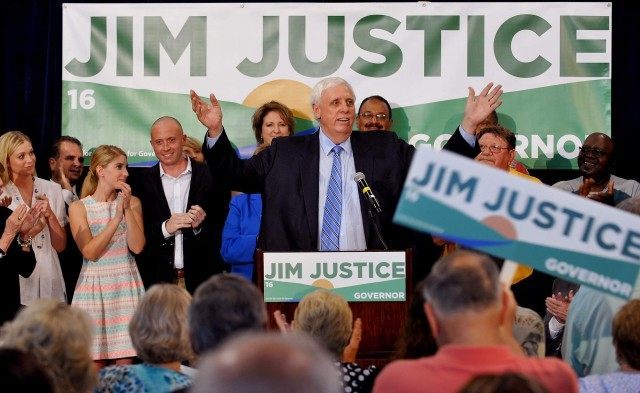CHARLESTON, W.Va. (AP) — Three decades after Republicans dared Jay Rockefeller to “spend it all” in a campaign for governor, billionaire businessman Jim Justice will help bankroll his own Democratic run for the state’s top executive job.
In the 1980 election, Republican Arch Moore slapped “Make him spend it all, Arch” bumper stickers across the state to chide Rockefeller, a wealthy Democratic governor from a famed American family.
Moore, who served three terms as one of the state’s most popular GOP governors, still couldn’t overcome Rockefeller and the $12 million he personally put toward that election.
West Virginia is no stranger to self-funded campaigns. But banking on your own cash doesn’t always equal success in politics, either in the Mountain State or across the country.
Justice’s wealth easily trumps Rockefeller’s. The 64-year-old built a $1.7 billion fortune in coal and agriculture, and has painted himself a job creator who bought and restored The Greenbrier historic resort.
Justice hasn’t said how much he will personally spend on his campaign. He has said he doesn’t want to use his cash “on an unbelievable scale” so he can keep supporters feeling invested in his candidacy.
“I want to contribute because I think it would be selfish and inconsistent to say Jim Justice is going to ask everybody in the world to bring him all the money to take care of his campaign,” Justice told reporters this week.
In addition to Rockefeller’s win, Democrat Gaston Caperton also beat Moore in 1988 for governor after using $3.2 million of his own money, according to media reports. Current Republican Attorney General Patrick Morrisey spent $1.4 million of his money in a 2012 win.
Still, many more hopefuls burned through millions of dollars only to lose.
Republican contender John Raese lost after spending $2.4 million in 2010 and $1 million in 2012 against Democratic U.S. Sen. Joe Manchin. He also loaned himself $2.3 million for a failed campaign against the late Democratic Sen. Robert Byrd in 2006.
Democrat Jim Humphreys funneled $6.1 million in 2000 and another $7.7 million in 2002 into losing U.S. House races against Republican Shelley Moore Capito, now a senator.
Nationally, Justice would join a list of wealthy political neophytes who put their money on the line for office. One of the most prominent recent examples is Republican Gov. Rick Scott of Florida. The former hospital chain executive spent $75 million of his own cash to get elected in 2010.
Republican Meg Whitman didn’t fare as well. The Hewlett-Packard executive dumped a whopping $175 million into a failed 2010 run for governor in California.
The price of politics in West Virginia is a fraction of those two states. In 2012, Democratic Gov. Earl Ray Tomblin won re-election after raising and spending $3.4 million.
The stats don’t necessarily work in self-funders’ favor. From 2002 to 2009, Only 668 of 6,171- or 11 percent – of self-funded candidates for state office won, according to the National Institute on Money in State Politics.
“The amount of money that (Justice) could bring to the table certainly is noteworthy,” said West Virginia Republican Party Chairman Conrad Lucas. “However, you can only spend so much without diminishing marginal returns. Voters across America have a history of rejecting self-funded candidates, with some exceptions.”
While running for governor, Rockefeller spun his self-funding into a positive, arguing he wouldn’t be beholden to special interests, said West Virginia Wesleyan College political science professor Robert Rupp.
Rockefeller and Caperton also climbed the political ladder more traditionally. Rockefeller worked his way up through elected slots as a Democrat, while Caperton was involved in Democratic Party politics, Rupp said.
Justice has changed his party affiliation multiple times, and was recently a Republican. He said he is still hashing out his policy views and wants to bridge the partisan divide with fresh ideas.
His candidacy has yielded criticisms from Democratic state Minority Leader Jeff Kessler, the only other mainstream candidate officially in the race.
“The hardworking men and women of West Virginia will decide if big ideas and hard work will beat big money,” Kessler said.

COMMENTS
Please let us know if you're having issues with commenting.